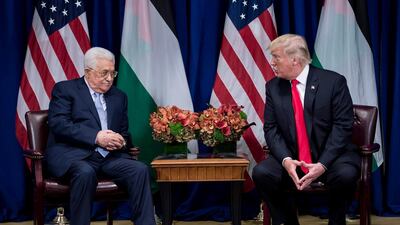As guests gathered around Palestinian President Mahmoud Abbas in the West Bank city of Ramallah on Sunday, he shared a compelling new detail about his talks with the Trump administration: it had proposed to him a Palestinian confederation with Jordan.
In the 1980s, Jordan’s King Hussein and Yasser Arafat, then leader of the Palestinians, had sat down to agree the workings of a similar arrangement. That deal broke down over fears that any such deal would leave the Palestinians without independence and any confederation talk died off after the Oslo Accords were signed in 1993. Now, the proposal put forward by Mr Trump’s son-in-law Jared Kushner and his Middle East envoy Jason Greenblatt is just as dead upon arrival.
Details of what they believe any Jordanian-Palestinian confederation would look like have not emerged. "We will not discuss any specific ideas or private conversations that may or may not have been had with leaders in the region," Mr Greenblatt told The National.
"Over the past 19 months we have probed all relevant parties about many ideas and possibilities. The plan, when released, will reflect ideas that we think are realistic, fair and implementable that will enhance the lives of the Israeli and Palestinian people,” he continued.
But the confederation offer, as revealed by the Palestinian leader himself, is but another attempt by Mr Trump’s team to plunge a stake into the heart of Palestinian self-determination and an end to the occupation.
While Mr Trump’s two advisers tasked with forging the “ultimate deal” have been working behind the scenes, he has moved the US embassy from Tel Aviv to Jerusalem in the face of Arab protests, cut all funding to the United Nations agency for Palestinian refugees (UNRWA) and allowed illegal Israeli settlement building to continue unabated.
So the idea of a confederation as advocated by the Israeli far-right is a poisoned chalice that the Palestinians, Jordan and Arab states would never accept.
Such a plan is viewed in Ramallah, Amman and the wider Arab world as another branch of the wider effort to bypass Palestinian dreams of statehood, East Jerusalem as the capital of any future state and the right of return, the three core tenets of the Palestinian issue.
"For a Zionist ideologue like Greenblatt or Kushner, their aim is to bury the Palestinian identity and to keep the whole of the West Bank under Israeli sovereignty," a Palestinian official, speaking on condition of anonymity, tells The National.

Emerging details of the planned US peace proposal, with heavy Israeli input, are inconceivable for all Palestinians – those in Gaza, the West Bank and Jerusalem – as well as the Jordanians and the wider international community, where a negotiated two-state solution with Jerusalem as the capital of both peoples remains the consensus.
According to Israeli newspaper Haaretz, any far-fetched US confederation plan would likely propose that the Palestinian Authority come under Jordanian rule, Jordanian troops protecting the borders of that confederation, and Gaza being swallowed by Egypt. Israel's illegal settlement enterprise would remain, with Israel taking total security and civil control of those outposts, and the Palestinians again left without the status of a state.
“When they talk of confederation it is the idea of Jordan is Palestine, and the denial of Palestinian rights,” the official says, referring to the Israeli far-right advocacy for a confederation. “It is not serious.”
For Jordanians, they fear that any confederation would see it become an alternative Palestinian homeland that could rock the balance of Palestinian and Jordanian tribes in the country, threatening one of the Middle East’s weakest economies. Jordanians of Palestinian origin reject it outright as it would end their status as refugees.
“It should be between two states, not a state and a stateless people,” says Hassan Barari, a Jordanian political analyst and author, adding that Israel should also recognise that state. “From a Jordanian perspective, it’s a non-starter.”
_______________
Read more:
US targets Palestinian right of return with UN funding cut
Palestinian refugee issue cannot be ignored, says UN agency chief
Editorial: Trump's decision to halt UNRWA funding wrecks hopes for peace
_______________
The Jordanian government immediately shot down the idea, saying it was “not open for discussion” and that “there is no alternative to the two-state solution”. Those in Jordan believe that Israeli and American intentions are underhanded, using such a proposal to sideline Palestinian statehood attempts and to pass the burden on to their country.
“This is very problematic because it is not about empowering the Palestinians to have their own state,” says Mr Barari. “It is a way of deception.”
Mr Abbas, long maligned by the Palestinian street for not appearing to serve its best interests, appeared to strategically implode the offer without refusing it outright. He said he responded to the Trump administration’s proposal by saying he would be open to confederacy, but only if Israel is part of that confederation in a tripartite arrangement. It is a suggestion that he knows Israel would never accept.
Having the PA join a confederation with Jordan “will give the Israelis the legitimacy to expand at the expense of the Palestinians” in the West Bank, the territory the Palestinians seek for a state and where more than 400,000 Jewish settlers live in illegal outposts, says Barari.
So for the Palestinians, mired in an ongoing and relentless occupation now supported by Washington more than ever before, it all comes down to one simple demand: give us our nation state.
“Once you have a Palestinian state, then you can discuss whether you have a confederation or not,” the Palestinian official says, putting Ramallah’s own stake through the heart of the Kushner-Greenblatt offer.

